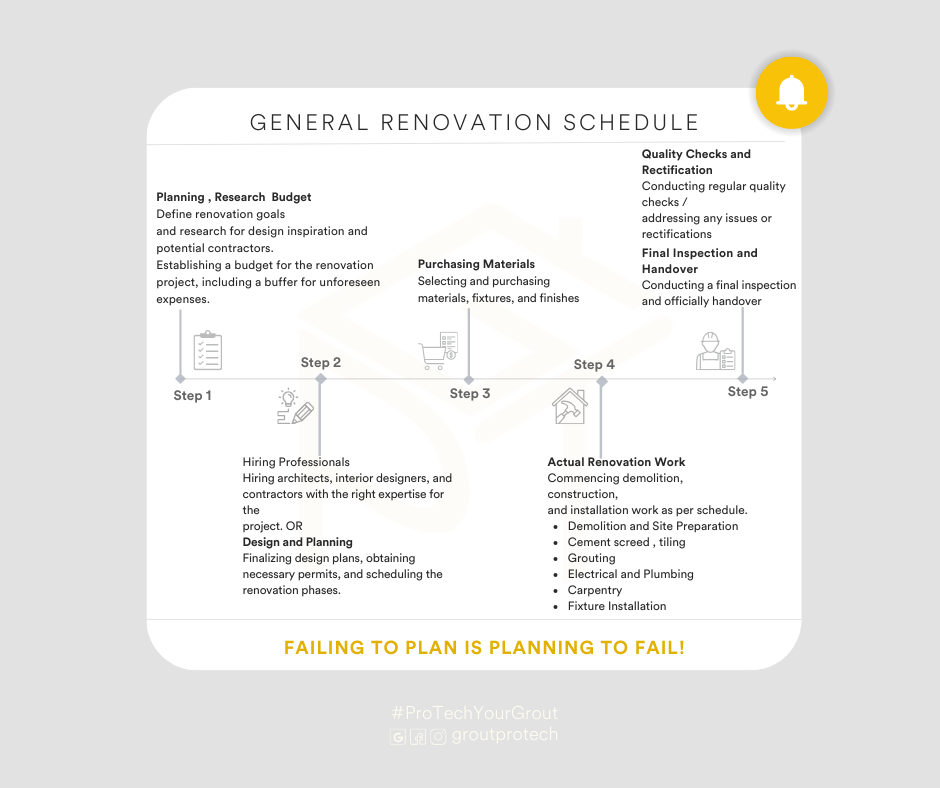Budgeting for a renovation project in Singapore requires careful consideration of various factors, including the size and scope of the project, the quality of materials and finishes desired, as well as labor costs and any additional expenses such as permits and taxes. Here are some tips for budgeting effectively for a renovation in Singapore:
Define Your Goals: Clearly outline your renovation goals and priorities. Determine which areas of your home or property require renovation and what changes you wish to make. This will help you focus your budget on the most important aspects of the project.
Research Costs: Research the costs of materials, fixtures, and labor in Singapore. Get multiple quotes from contractors and suppliers to ensure you're getting competitive prices. Keep in mind that prices can vary depending on factors such as the quality of materials and the complexity of the work.
Allocate Funds Wisely: Allocate your budget based on your priorities. Determine how much you're willing to spend on each aspect of the renovation, such as flooring, tiling, painting, and carpentry. Be prepared to adjust your budget as needed based on changing priorities or unforeseen expenses.
Include Contingency Funds: It's essential to include a contingency fund in your budget to cover unexpected expenses or changes in the scope of work. A common rule of thumb is to set aside 10-20% of your total budget for contingencies.
Consider Hidden Costs: In addition to materials and labor, there may be hidden costs associated with a renovation project, such as permits, taxes, demolition, disposal fees, and temporary accommodation if you need to move out during the renovation. Make sure to factor these costs into your budget.
Plan for Quality: While it's tempting to opt for the cheapest options to save money, investing in quality materials and workmanship can save you money in the long run by reducing the need for repairs and replacements. Balance cost-effectiveness with durability and aesthetics when making decisions about materials and finishes.
Be Realistic: Be realistic about what you can achieve with your budget. Prioritize essential renovations and be willing to make compromises or adjustments if necessary to stay within your financial limits.
Get Professional Advice: Consider consulting with a renovation contractor or interior designer who can provide guidance on budgeting and help you make informed decisions about your renovation project. They can also help you identify cost-saving opportunities and avoid common pitfalls.
By following these tips and planning your renovation budget carefully, you can ensure a successful renovation project that meets your goals without breaking the bank.
Without a well-thought-out budget and a detailed plan, the project can easily run into complications and exceed your financial limits. Here are a few reasons why failing to budget and plan adequately can lead to difficulties:
Overspending: Without a clear budget in place, it's easy to overspend on materials, labor, and unexpected expenses that arise during the renovation process. This can strain your finances and lead to financial stress.
Scope Creep: Without a detailed plan outlining the scope of work, there's a risk of scope creep, where additional tasks and changes are added to the project, increasing costs and extending the timeline.
Quality Compromises: A lack of budgeting and planning may lead to compromises in the quality of materials and workmanship to stay within budget constraints. This can result in subpar results and the need for costly repairs or replacements down the line.
Timeline Delays: Inadequate planning can lead to delays in the renovation timeline, especially if some unexpected issues or changes need to be addressed. This can inconvenience you and potentially incur additional costs for extended labor or rental expenses.
Regulatory Compliance Issues: Failing to budget for necessary permits and regulatory approvals can result in delays and fines from local authorities. It's essential to factor in these costs and ensure compliance with building codes and regulations from the outset.
Failing to plan is planning to fail!
To avoid these pitfalls, it's essential to develop a realistic budget and comprehensive plan before starting your renovation project. This includes:
Researching and obtaining accurate cost estimates for materials, labor, permits, and other expenses.
Creating a detailed project plan outlining the scope of work, timeline, and milestones.
Building in contingency funds for unexpected expenses or changes in the project scope.
Communicating openly and regularly with your renovation team to address any concerns or issues that arise.
Regularly monitoring expenses and progress against the budget and plan to identify any deviations early on.
By taking these proactive steps, you can ensure a smoother and more successful renovation experience, ultimately achieving the results you desire within your budget and timeline constraints. Read our previous article for Renovation steps and timeline

_edited_edited_edited_edite.png)


